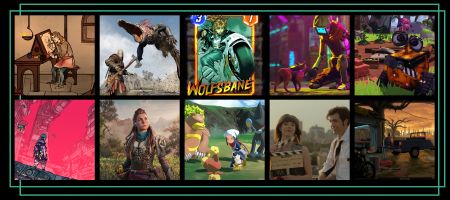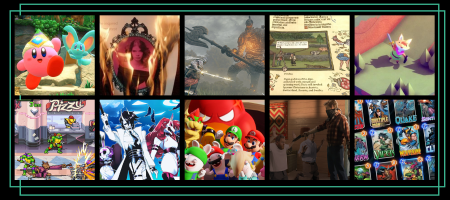Welcome to Punished Notes, Volume 26! For this edition, I’ll be discuss one of this year’s biggest releases, God of War Ragnarök. I’ll start off with a spoiler-free mini-review of the whole experience, mention some random things I liked and disliked, and then end with a number of brief (and a couple not-so-brief) thoughts on my favorite story moments and character arcs. THAT section will have a ton of spoilers, so if you’re not prepared for that, just stop after the “random things” section.
God of War Ragnarok Mini-Review
God of War Ragnarök genuinely surprised me. The latest from Sony Santa Monica exceeded my expectations in nearly every regard, and not because it pushes the medium forward in any meaningful way (it doesn’t). Rather, the title appears to have rectified many of the mistakes of its predecessor and provided a satisfying and emotionally resonating finale to the story of Kratos and his son, Atreus.
God of War (2018), Ragnarök’s predecessor, received widespread (and largely undeserved) praise for moving the franchise in a more grounded and emotionally mature direction. While I appreciated the more somber (and less grimdark) atmosphere, revamped combat system, and narrative re-focus, I couldn’t help but feel it missed the mark in many ways. Beyond the common complaints around minimal enemy variety and lack of meaningful side content (besides the Valkyrie battles), God of War’s plot, while certainly less cynical and offensive than that of prior games in the series, leaned heavily on “sad dad” tropes, so much so that the words “ludonarrative dissonance” grumbled in my brain throughout the entirety of my playthrough.

The sequel manages to right these wrongs in many ways. Enemy encounters, both in the Golden Path and optional content, are much more dynamic both in terms of Kratos’ opponents and his tools of destruction; side quests (many of which don the moniker “favors”) have greater narrative purpose and emotional gravitas. The main plot offers more urgency and higher stakes, yet is paced well enough that exploring the open environments doesn’t quite feel like the shirking of duty. And finally, the writing and voice acting achieve (and at times surpass) the standards set by Sony’s first-party lineup over the past decade.
Most importantly, however, Ragnarök manages to tell a compelling story that respects its supporting characters more than its predecessor did, and affords Kratos the opportunity to grow as a person and learn from his mistakes without giving him a pass for his brutal history of violence. This time, the bearded Spartan isn’t a cipher for male thirty-somethings learning empathy through marriage and children – the way he was in 2018 – and is instead allowed to be a complex character forced to reckon with his horrifying past yet offered the chance to truly better himself, if not for his sake then for the sake of those around him.
I started God of War Ragnarök anticipating, essentially, a video game of similar narrative quality as an MCU film, because that’s how most Sony exclusives feel to me. I expected polish, beautiful graphics, great voice acting, engaging combat mechanics, and an overwrought, surface-level narrative with tons of filler quests. What I got was one of the best experiences of 2022 that learned all the right lessons from its predecessor. Playing Ragnarök felt like the game people told me I’d get from God of War (2018), and I can safely say the sequel lives up to (most of) the hype.
Light spoilers
- RANDOM THINGS I LIKED: More diversity, better-written female characters, Norns teasing Kratos and Freya, Ironwood section, booming soundtrack, Richard Schiff’s voice acting, Atreus’ adventures in Asgard, Odin’s Ravens
- RANDOM THINGS I DISLIKED: Too many hints during puzzles (except when I need them for Nornir chests), inability to fast travel from wherever I am, too many slug encounters in the early Svartalfheim segments, transitioning from main quests to side quests felt narratively awkward at times, not enough DualSense-specific features
THE BEST STORY MOMENTS FROM GOD OF WAR RAGNARÖK
NOTES ON MY FAVORITE NARRATIVE BEATS
Huge spoilers ahead for the rest of this article. You’ve been warned!

Disappointing Dads
The two most emotional story moments for me were:
- Kratos angrily shouting “BOY!” at Atreus right before the angsty teen runs away
- Thrúd and Atreus carrying a drunken Thor out of a bar
In different ways, both of these segments underscore the special type of shame and embarrassment parents feel when losing control around their children. Kratos hadn’t yet realized that he needs to loosen his grip on Atreus’ youth, and reverts to his same old belittling words after losing his cool. With Thor, you see a man falling victim to his own addiction, barely able to process the loving sentiments of his own child while expressing his belief that he can never change. Even though the children react differently to each scenario, you can see in both cases how Atreus and Thrúd are forced to grapple with their fathers’ inability to change for the betterment of their families, and as a result express anger, frustration, resentment, and disappointment.
Both Kratos and Thor (with different results) attempt to redeem themselves later on, but the sting remains, particularly with Thor, who’s greatest flaw is that he can’t stand up to his own father. Both dads have to find a way to break the cycle of shitty parenting, but those moments highlight just how difficult that can be for older men set in their ways.
The game gives Kratos more chances to vocalize his regret, with the Ghost of Sparta even apologizing many times to his son, promising he’ll work on whatever issues have tormented him and try to respect Atreus as an individual. In a vacuum, these sentimental moments are nice to see (if a bit corny), but the fact that they come after we see Kratos belittle and berate his own child strengthen their impact. We see and hear (through Christopher Judge’s excellent performance) a man admit his failures to someone who’s supposed to look up to him, and that level of vulnerability creates a stronger bond between the two, not a weaker one.
For the most part, Thor doesn’t receive these same opportunities, but his moment of profound weakness offers the same point: to a certain extent, parents have just as much to learn from their children as children do from their parents, and the sooner they realize that (and adjust their behavior), the better their relationship will be.

The Kids Are All Right
Atreus developing friendships with Angrboda and Thrúd elevates the emotional impact of his character arc, since for the first time we get to see him interact with people (presumably) his own age and actually talk about his complicated familial relationships with people who can relate. Instead reluctantly uttering “yes, sir” to all of his father’s strict demands or begging for respect, Atreus gets to crack jokes and pal around with other teens trying to figure out their place in this world. These moments also underscore a critical flaw in the 2018 game, in that it only really gives Kratos’ perspective and treats his son (as well as his deceased wife) more like a narrative tool than an actual person.

The Darker Side of Old Friends
Mimir’s sidequests in Svartalfheim were among my favorite Favors in the entire game, because they paint the wise god in a completely different light. The Man Without a Body largely exists to provide Kratos and Atreus (as well as the player) with important context on the history of each mythological figure and locale, as well as provide counsel ahead of (and sometimes during) significant enemy encounters.
In these quests, however, you see the darker side of his work under Odin, as he asks Kratos to right various wrongs he’s committed in the past. Some of his misdeeds include the exploitation and oppression of dwarven laborers, the pollution of Svartalfheim’s air and water, and the enslavement of a poor (giant) whale for the purpose of supplying Odin with oil. Throughout these quests, you can hear the genuine regret and anguish in Mimir’s voice (shout out to Alastair Duncan), and the head even remarks on how much better everything looks and feels in the area every time you return.
Notably, the game’s text does not ask the player (or any playable character) to necessarily look past these actions or believe the wise god was simply misled or mistaken. Mimir has to look upon the suffering he’s caused and properly make amends, and he even explains how he’ll have to live with the guilt forever. That ultimately is the larger theme of God of War Ragnarok: it’s never enough to just say you’ve learned from your mistakes. You have to do better and be better.

Confession: I Got Got
I feel like a complete rube for missing that Týr was Odin in disguise the entire time. Honestly, I was shocked when that happened, and that shock was compounded by Brok’s sudden murder. Characters like that in games (i.e. non-romantic support NPCs) typically don’t die in such a sudden, brutal manner, and I was genuinely taken aback when it happened. RIP to my vulgar blue buddy.
While I’m on the subject: Sindri’s turn from lovable weenie to vengeful, unforgiving badass felt remarkably well-earned despite seeming like a heel turn in the moment. Witnessing his brother’s death due to the gullibility of his closest friends unleashed a side of him I didn’t expect, yet the writing in all his subsequent scenes was so sharp and punchy that the game pulls it off. His insistence that Atreus is at fault underscores another important motif: forgiveness is never guaranteed, nor should it always mark the end of one’s guilt. Sindri’s inability to converse with Kratos during Brok’s postgame funeral further hammers down this point.

The Mother We Share
My least favorite part of God of War (2018) was the game’s treatment of Freya. A story about the trials and tribulations of parenting and the lengths one will go in service of their child ends with the only living woman in the entire plot behaving irrationally. Kratos was just a dad doing his best, but Freya received the gendered framing of a mother who must suffer the consequences of going too far to protect her ungrateful son, and naturally goes crazy and screams bloody murder toward’s a stoic Kratos. The broken dad got a chance to redeem himself; the broken mom turns into an unreasonable, emotional harpy. Given her importance to the plot (and the game’s focus on the potential pitfalls of parental guidance), she deserved better.
Ragnarök repairs much of this framing, and not just through the inclusion of more women (and therefore a broader range of perspectives). The title gives the goddess ample time to express her thoughts freely in multiple contexts while also providing her with plenty of thrilling plot moments, allowing her to define herself beyond just being a magical mother. Freya now gets to be a great leader, warrior, and companion; she and Kratos can finally speak to each other as confident, steadfast adults, not just as grieving parents.
In a particularly heartbreaking moment, Freya chastises Kratos and explains just why she despised him so much (beyond the obvious) even after they had learned to work together to fend off a large beast. In this tense sequence, Freya says that she can never forgive the Ghost of Sparta for killing her son (even if it was to save her life), but acknowledges that Kratos isn’t her enemy, and Kratos even expresses regret for taking that crucial choice away from her.
Freya becomes an ally for the remainder of the experience (including serving as Kratos’ sidekick in place of Atreus in the postgame) and even goes so far as to consider Kratos a friend (though she does so somewhat begrudgingly). While that transition was jarring at first (narratively, the game goes from “I will always hate you but I’ll fight by your side” to “can you do random favors for me for the next hour or two”), it feels earned by the end of the Golden Path, as the pair have gone through an odyssey of their own, similarly criticized by the Norns and deceived by Odin, all whilst learning to sympathize with one another’s pain.
I still wish there was more space for a nuanced exploration of motherhood in AAA games, especially considering the wealth of complicated father figures. But the way Sony Santa Monica handled Freya the second time gives me hope that they recognized some of the faults of the previous game and have learned to do better, though there’s still a long way to go.
– – –
How did you feel about God of War Ragnarök? Let us know in the comments!
Sam has been playing video games since his earliest years and has been writing about them since 2016. He’s a big fan of Nintendo games and complaining about The Last of Us Part II. You either agree wholeheartedly with his opinions or despise them. There is no in between.
A lifelong New Yorker, Sam views gaming as far more than a silly little pastime, and hopes though critical analysis and in-depth reviews to better understand the medium's artistic merit.
Twitter: @sam_martinelli.












I just finished the game and really appreciated this debrief/post-mortem (if you’ll forgive the expression). Very well written and got to the meat of everything I would have liked to have seen discussed. I hadn’t considered the Freya/Kratos juxtaposition but am inclined to agree on that point.